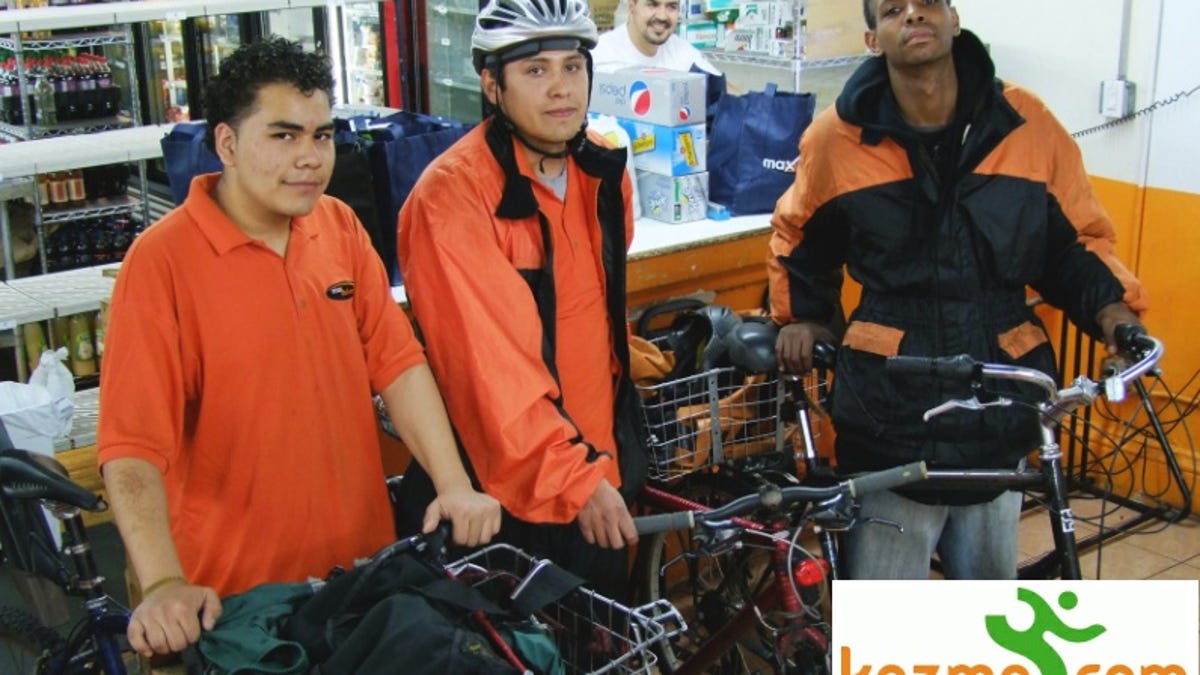 Why You Can Trust CNET
Why You Can Trust CNET Burnouts rejoice, Kozmo.com's progeny lives on
A former exec from Kozmo.com, a company much celebrated for delivering munchies and movies to customers' homes before it closed down 10 years ago, has built his own delivery service. Unlike Kozmo, this one is profitable.

When Kozmo customers ordered snacks or movies from the Internet delivery service via their PCs, the goods weren't teleported, ala "Star Trek." But it almost felt as if they were.
In the late 1990s, an orange-clad Kozmo delivery person would appear at a customer's door typically within an hour after an order was keyed in. The Kozmo man or woman might have cradled a pint of rocky road ice cream, an Al Green CD, a box of Junior Mints, or some other convenience item. The Internet was still new then, and Kozmo's service helped to raise expectations of how technology might make our lives easier. Who said we couldn't live like the futuristic cartoon family from "The Jetsons?"
It was not to be. Ten years ago this month, Kozmo collapsed under its delivery costs. In the wake of the closing, many business experts concluded that carting small-ticket, low-margin items to people's homes, even with the help of the Web and sophisticated logistical software, just wasn't profitable.
Chris Siragusa disagreed. As Kozmo's former chief technology officer, Siragusa saw what was right and wrong with the company. He put his experiences to work at Max Delivery, the New York-based Internet home-delivery company he founded in 2005.
Sirgusa's 35 delivery people whisk fresh meat, produce, dairy, household items, wine and spirits, over-the-counter medicines, DVDs, and local gourmet and specialty foods to customers' front doors. Like Kozmo, the company guarantees delivery within an hour.
Of the many differences between the two companies, the most important are that Max Delivery is still around after five years and is profitable, according to Siragusa.
To accomplish that, Max Delivery took a much more methodical approach to building a home-delivery business than Kozmo. Even among the big spending Internet companies of the dot-com age, Kozmo stood out with its go-go expansion strategy. Back then, profits took a back seat to snatching market share.
"Kozmo was an amazing idea," Siragusa told CNET. "The problem was they were victims of the times. Back then it was about how fast you can grow your company. When you're trying to do that, the efficiencies of operating a business get sacrificed. We're taking a different tack. We can take our time and make the company as efficient as possible."
Uncontrolled spending
Efficiency isn't what Kozmo was known for. Two years after Joseph Park and Yong Kang founded the company, an inexperienced management team was overseeing complex delivery operations in nearly a dozen major U.S. cities, including New York, San Francisco, and Chicago. Kozmo's leadership was so determined to build market share that it refused to require a delivery charge or set a minimum purchase amount, even when the policy led to big losses.
Because of that, it wasn't unusual for Kozmo to spend $7 delivering a 50-cent box of candy.
In contrast, after four years Max Delivery still only operates in Manhattan and only in the lower half of the island. Siragusa's company didn't have Kozmo's treasure trove of venture capital money and was forced to keep a close eye on the bottom line.
To receive free delivery from Max Delivery, customers must order a minimum of $75. Smaller orders require a $2.95 delivery fee.
Siragusa wouldn't disclose many details of his company's financial performance but said Max Delivery has grown by 20 percent every year.
To help reduce costs, he has worked on perfecting logistical software that helps bundle orders from the same areas so delivery people can make multiple stops. It also helps pinpoint the most efficient routes for delivery people to take. Max Delivery's software also must take the weight of an order into account. All orders are delivered by bicycle.
"I have to meet very aggressive weight and volume requirements to make sure people travel safe," Siragusa said. "It's an interesting problem to solve from a computer-science perspective."
How big is the market?
Siragusa is not alone in continuing to believe in home delivery. Peapod was one of the companies that competed in the sector during the dot-com boom and it's one of the few to have survived. Like Kozmo, other Web delivery services such as Webvan and Urbanfetch were forced to close down.
And just how big the home-delivery market can become is still unclear. Certainly, the sector never fulfilled the lofty predictions that some analysts made back in 1999. More recently, Amazon, which invested $60 million into Kozmo in 2000, was expected to expand an experimental free-of-charge home-delivery service called AmazonTote, but abruptly shut the service down last month.
Amazon still operates AmazonFresh, which delivers groceries to homes in the Seattle area.
To Siragusa, what's important is that he continues to grow his company and expand his business carefully. He hopes to some day soon operate in other areas of Manhattan and possibly Brooklyn.
So, will Max Delivery's customers be similar to Kozmo's old clientele, who the media accused of being burnouts and stoner couch potatoes? (Someone once told me that Kozmo should incorporate a marijuana leaf in the company logo).
"I'm not going to lie and say we don't have that customer," Siragusa said. "But our core customers typically are just busy New York professionals."

